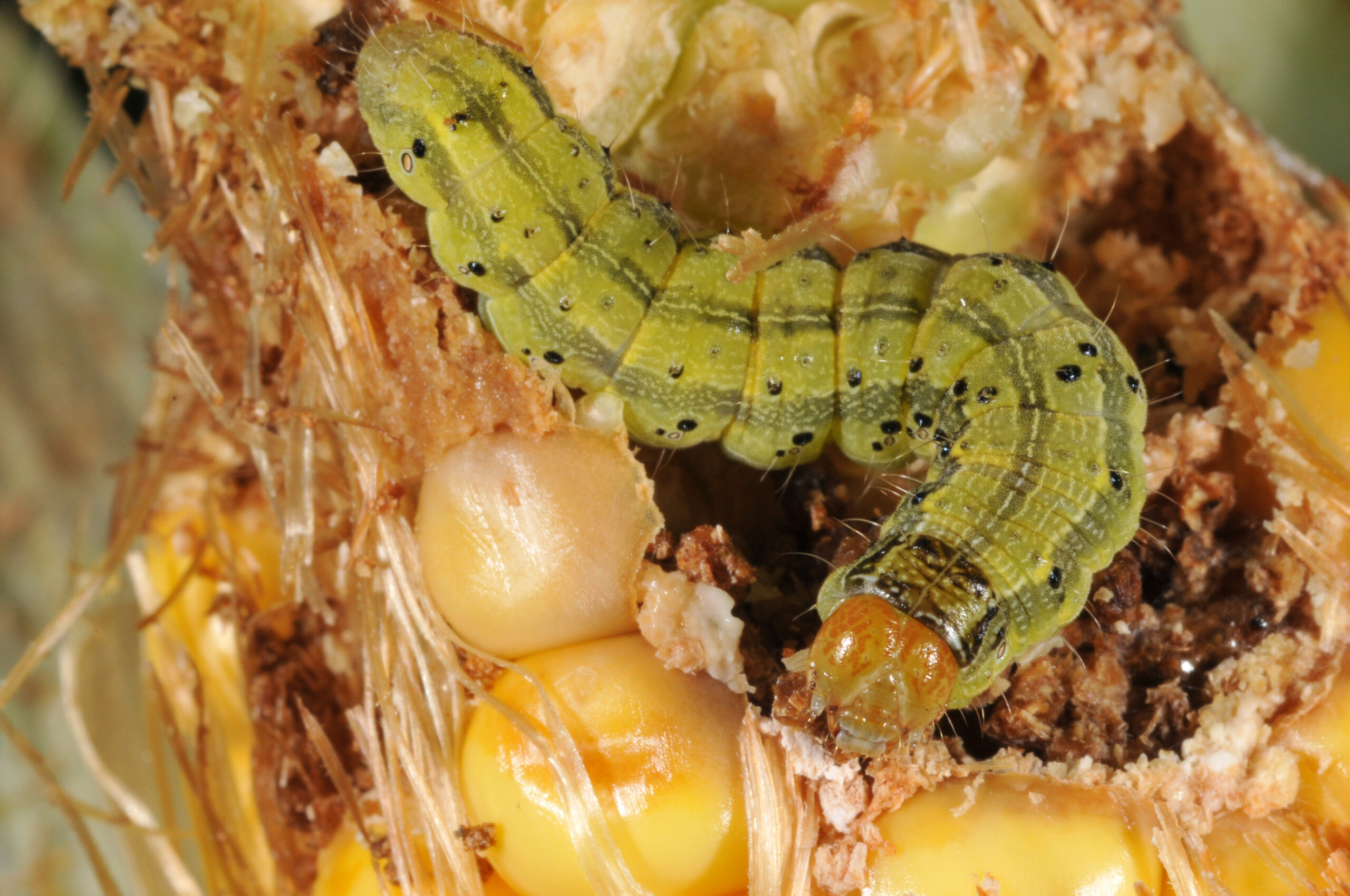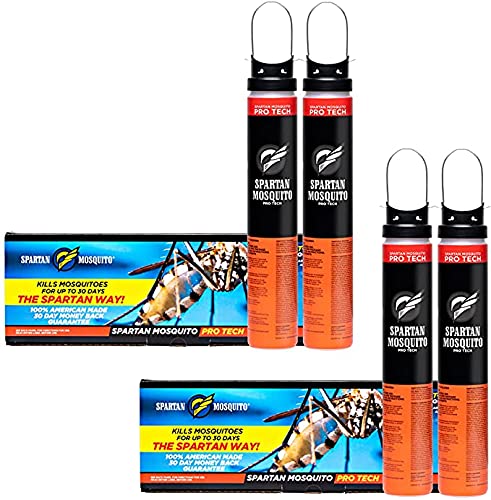Insecticide For Corn Earworm
Corn earworm, Helicoverpa zea, is the primary economic pest of sweet corn in West Virginia. Infestation levels in the Northeast region of the United States vary with the year, time of season and farm location. Infestations of corn earworm in West Virginia result from migrant moths carried northward on storm fronts during mid-to-late summer. Sweet corn producers rely on timely pest monitoring and insecticide sprays to control this pest. However, insecticide control programs are costly, pose exposure risks to applicators, require considerable time and management, and can negatively impact non-target organisms and the environment.
Corn earworms are a common pest in corn, and can be devastating to the crop. They are caterpillars that feed on the leaves of the corn plant, destroying the leaves and eventually moving on to feed on the kernels. These caterpillars have a green body with orange stripes and a brown head with red dots.
The eggs hatch into larvae that are about half an inch long when they first hatch out of their eggs. They are white or cream-colored worms with black heads and black legs. As they grow, they change into pupae which are dark brown or black colored.
The adult form of this insect is a moth with a wingspan of one inch or more. The front wings are dark brown with light brown spots while their hind wings are lighter brown than their front wings with darker brown spots on them as well. The females lay their eggs on corn plants so that they can hatch into larvae when they come into contact with moisture from rain or dew at the tips of ears where they feed before moving into other parts of the ear itself once it has ripened enough for them to be able to do so safely without being eaten by birds or other predators
Corn Earworm Control
Chemical Controls for Corn Earworm
When using insecticides for corn earworm control, it is important to time the first spray at early silking and then apply subsequent sprays on a schedule based on the flight activity of moths. Most corn earworm eggs are laid directly on the silks. Once larvae hatch, they quickly move down the silk channel and begin feeding on the ear tip, where they are protected from insecticide sprays. Therefore, it is necessary to target larvae before they enter the ear by treating silk tissue when moth pressure is high.
Pyrethroid insecticides (beta-cyfluthrin, bifenthrin, cyfluthrin, esfenvalerate, lambda-cyhalothrin, permethrin, zeta-cypermethrin) have been the traditional choice for control, but their control efficacy has declined in certain areas due to resistance in corn earworm populations.
Spray mixtures containing an alternative active ingredient plus a pyrethroid are often used to circumvent resistance development and improve control of other sweet corn pests. Rotations and mixtures with different active ingredients, such as chlorantraniliprole (Coragen), methomyl (Lannate), spinetoram (Radiant) and spinosad (Blackhawk), are increasingly used and can provide control. However, it is widely recognized that pyrethroids no longer provide enough ear protection making it necessary to switch to alternative products.
Biological Alternatives Resistant to Corn Earworm
Bt Sweet Corn Hybrids
The problems and challenges with foliar insecticide applications can essentially be eliminated with Bt sweet corn, which expresses insect toxic proteins from the bacterium, Bacillus thuringiensis (Bt), in plant tissue. This technology has revolutionized the way many corn insect pests are managed. There are three types of Bt sweet corn commercially available for lepidopteran pests: Attribute® hybrids (expressing Cry1Ab protein) and Attribute® II hybrids (expressing the Cry1Ab and Vip3A proteins) both from Syngenta Seeds, as well as Performance Series™ hybrids (expressing the Cry1A.105 and Cry2Ab2 proteins) from Seminis Seeds.
Attribute® hybrids have been commercially available since 1998, and acreage of this hybrid has increased significantly since its introduction. However, effectiveness of the Cry1Ab protein and the Attribute® hybrid has varied for controlling corn earworm, particularly in the southern United States. Recent field trials conducted in West Virginia have shown that Attribute® II hybrids can provide excellent control of corn earworm larvae. Growers using Attribute® II hybrids would likely not need to use supplemental insecticidal sprays, except for secondary pests.
Due to the yearly migration of potentially Cry1Ab-resistant moths from southern regions, the risk of further resistance development in the entire Northeast will likely increase and may compromise the reliability and durability of other Bt proteins.
Integrated pest management can further delay the evolution of resistance and must also be incorporated into future corn earworm management plans. Integrated pest management (IPM) practices, such as monitoring, crop rotation, rotation of Bt hybrids that produce different Bt proteins and judicious use of insecticides, are all highly compatible with the goals of IPM and insect resistance management for corn earworm.
Insecticide For Corn Earworm
Corn Earworm (Helicoverpa zea) is a moth that lays its eggs on corn and other plants. The larvae hatch, feed on the plant, and damage it. Corn Earworm is one of the most damaging insects to corn in North America.
Insecticides are chemicals that kill pests or insects. Insecticide can be sprayed directly on plants to kill them or put into soil near plants to prevent them from growing. Insecticides can also be used as sprays that you put on your skin, or as liquids you drink. Insecticides can be harmful if they are not used correctly.
List Of Insecticide For Corn Earworm
Additional Info :
| Item Dimensions | |
| Height | 9.21 Inches |
| Width | 0.1 Inches |
| Length | 6.14 Inches |
| Weight | 0.17 Pounds |
Additional Info :
- INSECT KILLER – This pest control is great for use on cabbage looper, hornworms, tent caterpillar, gypsy moth, bagworm and many more.
- PROTECTS FRUITS, VEGETABLES, SHADE TREES & ORNAMENTALS – Designed for use on broccoli, cauliflower, kale, mustard greens, eggplant, pepper, melons, tomatoes, cabbage, shade trees and ornamentals.
- DOESN’T HARM BENEFICIAL INSECTS – Kills worms and caterpillar stage insects while causing no harm to birds, earthworms, or beneficial insects, such as honeybees and ladybugs.
- FAST ACTING FORMULA – Must be eaten by worms or caterpillars to be effective. After ingesting, bugs immediately stop feeding and will die within 2-3 days.
- ORGANIC GARDENING – The active ingredient of the product is a natural strain of the bacterium Bacillus thuringiensis, which is a leading insecticide used worldwide. Approved for organic gardening, our product is safe for use around people and pets.
Additional Info :
| Item Dimensions | |
| Height | 12 Inches |
| Width | 3 Inches |
| Length | 6 Inches |
| Weight | 2.33 Pounds |
| Release Date | 2021-11-10T00:00:01Z |
- CONTAINS BOTANICAL INSECTICIDES: Spray on roses, vegetables, houseplants, ornamentals, trees, shrubs and flowers right up to the day of harvest.
- KILLS ON CONTACT: Kills aphids, tomato hornworms, green fruitworms and other listed insects.
- PROTECTS YOUR WHOLE GARDEN: Use both indoors and outdoors.
- READY-TO-USE PEST CONTROL: Spray upper and lower leaf surfaces – no mixing required.
- APPLY AS NEEDED: Treat weekly or apply as needed to control infestations (up 10 to times per season).
Additional Info :
| Item Dimensions | |
| Height | 10.33 Inches |
| Width | 2.25 Inches |
| Length | 4.25 Inches |
| Weight | 3 Pounds |
- 100% American Made Do-It-Yourself Mosquito Killer
- Four tubes [included in this 1 Acre Pack] will kill mosquitoes in areas 1 acre or smaller
- 30 day money back guarantee
- Kills mosquitoes that may carry West Nile Virus, Zika Virus, Dengue Fever, St. Louis encephalitis, Western equine encephalitis, and Eastern equine encephalitis for up to 30 days
- SPARTAN MOSQUITO PRO TECH IS NOT AVAILABLE TO RESIDENTS OF California, Maryland, and outside the United States
Additional Info :





